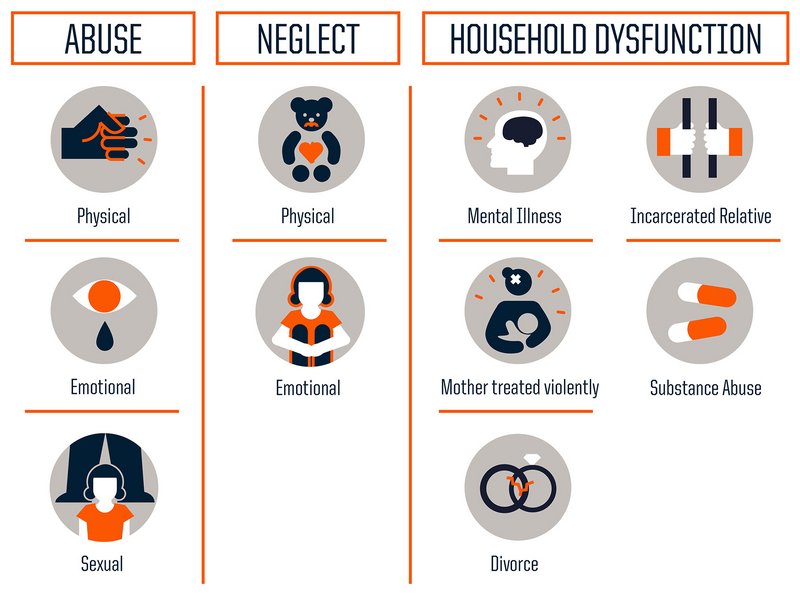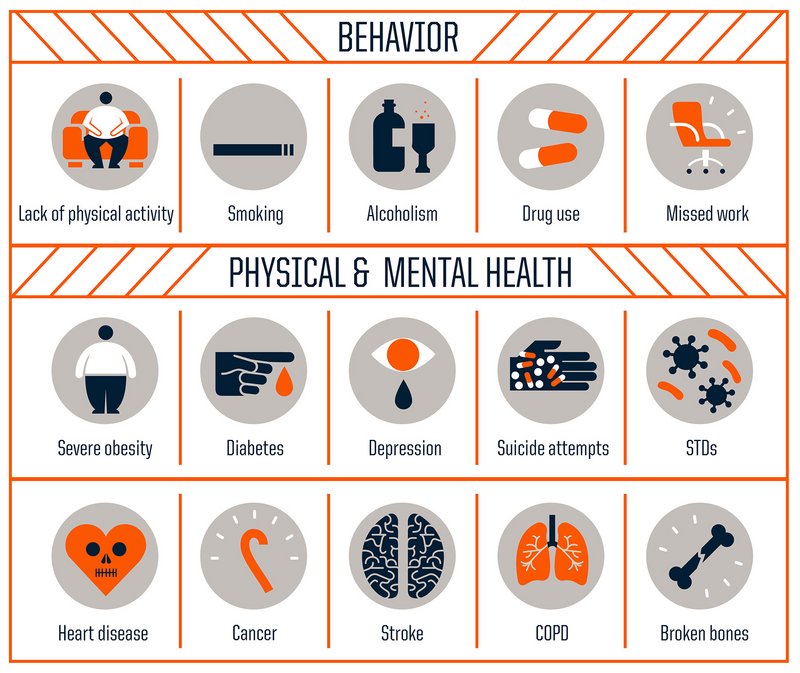
 |
|
|
|
|
#1 |
|
Superlative Soul Sister
How Do You Identify?:
Lesbian stone femme Preferred Pronoun?:
She, her Relationship Status:
Single Join Date: Dec 2013
Location: Cottage of Content
Posts: 13,055
Thanks: 41,103
Thanked 34,151 Times in 8,617 Posts
Rep Power: 21474860            |
Take The ACE Quiz — And Learn What It Does And Doesn't Mean
March 2, 2015. 2:57 PM ET LAURA STARECHESKI An ACE score is a tally of different types of abuse, neglect, and other hallmarks of a rough childhood. According to the Adverse Childhood Experiences study, the rougher your childhood, the higher your score is likely to be and the higher your risk for later health problems. You can take the test here. So, you've got your score. Now what? First, remember that the ACE score isn't a crystal ball; it's just meant as guidance. It tells you about one type of risk factor among many. It doesn't directly take into account your diet or genes, or whether you smoke or drink excessively — to name just a few of the other major influences on health. To learn more, check the CDC's ACE Study website. You'll find, among other things, a list of studies that explore the ways adverse childhood experiences have been linked to a variety of adult conditions, ranging from increased headaches to depression to heart disease. Remember this, too: ACE scores don't tally the positive experiences in early life that can help build resilience and protect a child from the effects of trauma. Having a grandparent who loves you, a teacher who understands and believes in you, or a trusted friend you can confide in may mitigate the long-term effects of early trauma, psychologists say. “There are people with high ACE scores who do remarkably well," says Jack Shonkoff, a pediatrician and director of the Center on the Developing Child at Harvard University. Resilience, he says, builds throughout life, and close relationships are key. Recent research also suggests that for adults, "trauma informed" therapy — which can center on art, yoga or mindfulness training — can help. Three Types of ACEs  Source: Centers for Disease Control and Prevention Credit: Robert Wood Johnson Foundation How best to find and help kids who are experiencing abuse and neglect right now? Child psychologist Hilit Kletter, of Stanford University's School of Medicine, says that to spot these children, she looks for visible signs of stress to understand what might have happened to them and how best to intervene. Some kids have nightmares or recurring thoughts of a stressful event, she says, or may re-enact the trauma through play. Or the child may seem distracted or withdrawn. "This will come out at school," Kletter says. "Teachers will tell parents [their child] seems to be in a daze in the classroom, not paying attention." ACEs Increase Health Risks According to the Adverse Childhood Experiences study, the rougher your childhood, the higher your score is likely to be and the higher your risk for various health problems later.  Source: Centers for Disease Control and Prevention Credit: Robert Wood Johnson Foundation Kletter says reactions to trauma are sometimes misdiagnosed as symptoms of attention deficit hyperactivity disorder, because kids dealing with adverse experiences may be impulsive — acting out with anger or other strong emotions. "It's something that's very common in trauma: difficulty in regulating emotions and behavior," she explains. "That's why a lot of these kids get in trouble with the classroom." Shonkoff's research center at Harvard tests interventions that can build resilience in kids who are growing up with adverse experiences — not just problems in the family, such as those the ACE study investigated, but also trauma stemming from poverty, for example, or from the chronic stress of racial or gender discrimination. To bolster parents, the Harvard team is testing interventions right now that use video coaching to show moms and dads how to engage their babbling infants, using sounds and facial expressions in a style Shonkoff calls serve and return. Shonkoff says these early interactions — a kind of conversation — have been shown to help children with later learning and literacy. Even more important, they boost kids' resilience, by helping them build secure attachments with caring adults. Research suggests that just one caring, safe relationship early in life gives any child a much better shot at growing up healthy. https://www.npr.org/sections/health-...nd-doesnt-mean |
|
|

|
| The Following 3 Users Say Thank You to Orema For This Useful Post: |
|
|
#2 | |
|
Member
How Do You Identify?:
Stonefemme lesbian Preferred Pronoun?:
I'm a woman. Behave accordingly. Relationship Status:
Single, not looking. Join Date: Jan 2010
Location: NYC
Posts: 1,467
Thanks: 9,474
Thanked 7,150 Times in 1,206 Posts
Rep Power: 21474852            |
Quote:
Well, that was depressing.
__________________
Cheryl |
|
|
|

|
| The Following User Says Thank You to CherylNYC For This Useful Post: |
|
|
#3 |
|
Superlative Soul Sister
How Do You Identify?:
Lesbian stone femme Preferred Pronoun?:
She, her Relationship Status:
Single Join Date: Dec 2013
Location: Cottage of Content
Posts: 13,055
Thanks: 41,103
Thanked 34,151 Times in 8,617 Posts
Rep Power: 21474860            |
More on the ACE Scores.
https://americanspcc.org/take-the-aces-quiz/ The quiz score is based on ten types of childhood trauma measured in the ACE Study. Five are personal — physical abuse, verbal abuse, sexual abuse, physical neglect, and emotional neglect. Five are related to other family members: a parent who’s an alcoholic, a mother who’s a victim of domestic violence, a family member in jail, a family member diagnosed with a mental illness, and the disappearance of a parent through divorce, death or abandonment. You get one point for each type of trauma. The higher your ACE score, the higher your risk of health and social problems. As your ACE score increases, so does the risk of disease, social and emotional problems. With an ACE score of 4 or more, things start getting serious. The likelihood of chronic pulmonary lung disease increases 390 percent; hepatitis, 240 percent; depression 460 percent; suicide, 1,220 percent. The most important thing to remember is that the ACE score is meant as a guideline: If you experienced other types of toxic stress over months or years, then those would likely increase your risk of health consequences. Fortunately, our brains and lives are somewhat plastic, which means our mental and physical health can improve. The appropriate integration of resilience factors born out of ACE concepts — such as asking for help, developing trusting relationships, forming a positive attitude, listening to feelings — can help people improve their lives. ____________________ And here’s a link to a Ted Talk by Dr. Nadine Burke Harris on how childhood trauma affects health across a lifetime. https://www.youtube.com/watch?v=uXXTLf7oouU&t |
|
|

|
|
|
#4 |
|
Senior Member
How Do You Identify?:
Trotskyist, Anarcho-syndicalist Preferred Pronoun?:
They, Them, Their, Sir Bitch Relationship Status:
open Join Date: Sep 2016
Location: Great White North!
Posts: 4,332
Thanks: 16,812
Thanked 4,710 Times in 1,603 Posts
Rep Power: 21474848            |
The survey failed to address children whose parent put their kids in a psychiatric hospital during the formative years (puberty age 11-14). That is an experience that molds from then on.
Its an experience that can could effect every day and every activity. It effects each and every thought. No shrink, counselor, religion, god can help get through this. Few meds give release, some street drugs, nothing liquid helps. Anyone have a severe lack of the ability to speak or do any activity wout significant planning? Spontaneity gone? |
|
|

|
 |
|
|